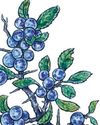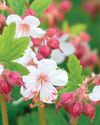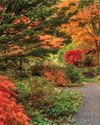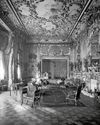
The Wild Garden at Doddington Hall, Lincolnshire
The home of Mr and Mrs James Birch.
PERCHED on the westerly edge of Lincolnshire, Doddington Hall has remained in family ownership since it was built in 1600. An exquisite 1707 copper engraving of the estate by Johannes Kipp illustrates a cluster of outbuildings, including gatehouse and church, alongside tightly-controlled geometric gardens: a chessboard of crisp parterres, regimented orchards and cruciform paths. Today, swinging into the drive, that formality seems to be intact. A pair of topiary unicorns rear in the East Garden, where vast yew domes echo the cupolas on the Elizabethan building. On the opposite side, the walled West Garden retains neatly-clipped box-edged beds, crammed in summer with iris and roses.
Step through the western gate, however, on a brisk February morning and the atmosphere is entirely different. Tremendous sweeps of spring bulbs spangle the lawns, as luxurious as the bejewelled portraits in the brick, three-storey house itself, designed by Robert Smythson. The spacing and colour shading is so harmonious that it seems to be entirely wild and natural. A stone-flagged path flanked by yew columns is lapped on either side by continuous waves of tissue-thin, silvery Crocus tommasinianus.
'My parents initially planted a few cultivars, such as Crocus 'Barr's Purple' and 'Whitewell Purple', but they reverted to species,' explains Antony Jarvis, who inherited Doddington in the 1970s and has gardened here for more than 50 years. His eldest daughter, Claire, and her husband, James Birch, took over the estate in 2007; Mr Jarvis now lives in a house attached to the walled garden, his spade permanently propped up by the back door. These measureless drifts of flowers that appear to have existed for centuries are all his work.
Esta historia es de la edición February 08, 2023 de Country Life UK.
Comience su prueba gratuita de Magzter GOLD de 7 días para acceder a miles de historias premium seleccionadas y a más de 9,000 revistas y periódicos.
Ya eres suscriptor ? Conectar
Esta historia es de la edición February 08, 2023 de Country Life UK.
Comience su prueba gratuita de Magzter GOLD de 7 días para acceder a miles de historias premium seleccionadas y a más de 9,000 revistas y periódicos.
Ya eres suscriptor? Conectar

Kitchen garden cook - Apples
'Sweet and crisp, apples are the epitome of autumn flavour'

The original Mr Rochester
Three classic houses in North Yorkshire have come to the market; the owner of one inspired Charlotte Brontë to write Jane Eyre

Get it write
Desks, once akin to instruments of torture for scribes, have become cherished repositories of memories and secrets. Matthew Dennison charts their evolution

'Sloes hath ben my food'
A possible paint for the Picts and a definite culprit in tea fraud, the cheek-suckingly sour sloe's spiritual home is indisputably in gin, says John Wright

Souvenirs of greatness
FOR many years, some large boxes have been stored and forgotten in the dark recesses of the garage. Unpacked last week, the contents turned out to be pots: some, perhaps, nearing a century old—dense terracotta, of interesting provenance.

Plants for plants' sake
The garden at Hergest Croft, Herefordshire The home of Edward Banks The Banks family is synonymous with an extraordinary collection of trees and shrubs, many of which are presents from distinguished friends, garnered over two centuries. Be prepared to be amazed, says Charles Quest-Ritson

Capturing the castle
Seventy years after Christian Dior’s last fashion show in Scotland, the brand returned under creative director Maria Grazia Chiuri for a celebratory event honouring local craftsmanship, the beauty of the land and the Auld Alliance, explains Kim Parker

Nature's own cathedral
Our tallest native tree 'most lovely of all', the stately beech creates a shaded environment that few plants can survive. John Lewis-Stempel ventures into the enchanted woods

All that money could buy
A new book explores the lost riches of London's grand houses. Its author, Steven Brindle, looks at the residences of plutocrats built by the nouveaux riches of the late-Victorian and Edwardian ages

In with the old
Diamonds are meant to sparkle in candlelight, but many now gather dust in jewellery boxes. To wear them today, we may need to reimagine them, as Hetty Lintell discovers with her grandmother's jewellery